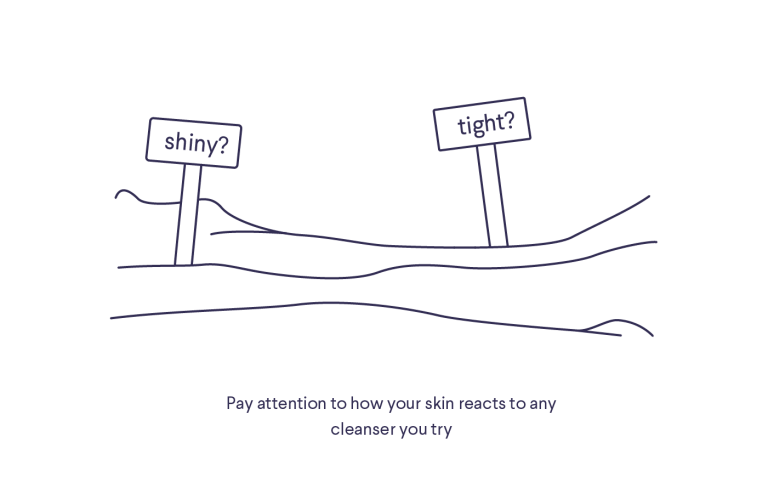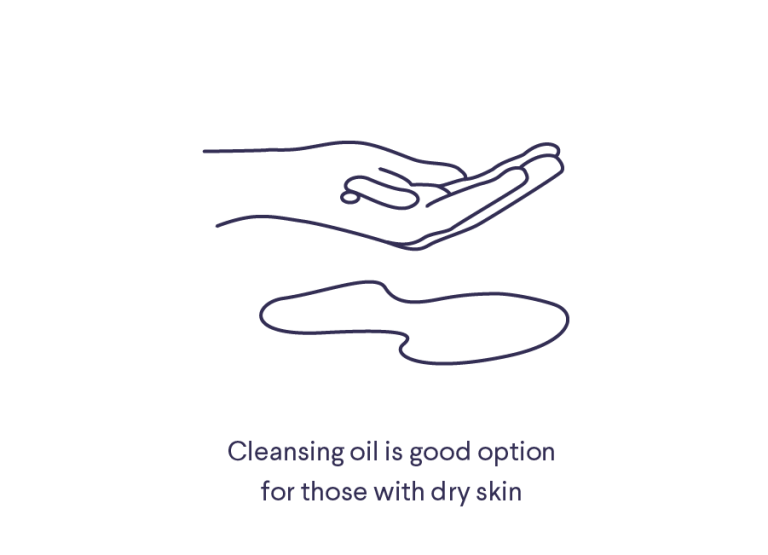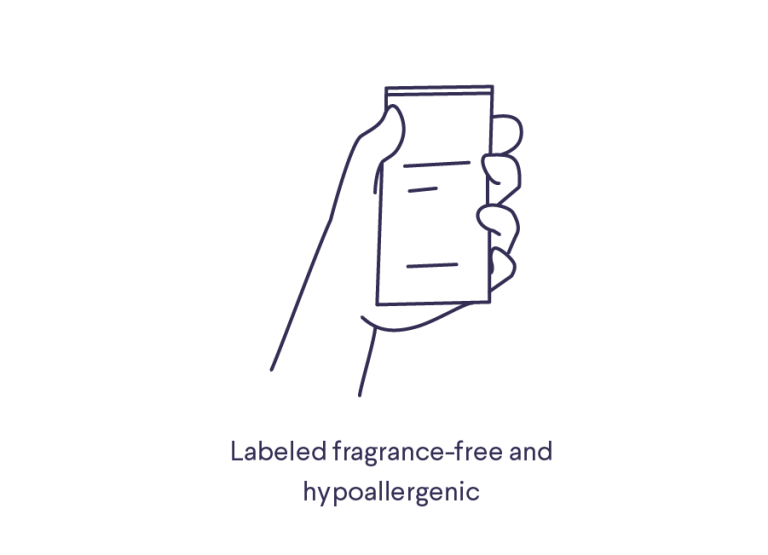How it works:
Share your skin goals and snap selfies
Your dermatology provider prescribes your formula
Apply nightly for happy, healthy skin
How it works:
How it works:
Share your skin goals and snap selfies
Your dermatology provider prescribes your formula
Apply nightly for happy, healthy skin
How it works:
Which face cleanser is right for you?
There are so many different facial cleansers on the market to choose from—these expert insights can help you figure out the best option for your unique skin.



Not every cleanser is made equally. So many options out there have key ingredients that can hurt more than they help your skin, such as fragrance (potentially irritating) and coconut oil (pore-clogging).
At Curology, we’re all about sharing knowledge that can help you take care of your skin as best as possible. So, we’ve whipped up this guide with everything you need to know about cleansing your face.
The basic rules of cleansing
Cleansing is the cornerstone of any effective skincare regimen. This process removes dirt, excess oil, and impurities from your skin’s surface and prepares it to absorb other skincare products. Following some basic rules is crucial to ensure your skin gets the maximum benefits while minimizing possible adverse effects.
The first important thing is to be gentle with your skin
You can use a cleanser with a gentle formula or just wash with plain water. Sometimes, swiping a cotton pad soaked with micellar water is all you need (read more on micellar water below). It’s a good idea to apply a non-abrasive facial cleanser that’s alcohol-free with just your fingertips to ensure your skin doesn’t get irritated.¹

Whatever facial cleanser you try, pay attention to how your skin reacts to it. There are some pretty general signs that almost all skincare products share that show it isn’t working for you.
After you use it, does your face:
Look shiny and feel tight?
Feel dry?
Get red and/or stingy?
You should stop using it and consult with a dermatology provider!
Don’t wash your face with hot water
No matter what facial cleanser you use, here’s our professional advice: don’t wash your face with hot water. Hot water can dry out your skin,² leaving it damaged and vulnerable. Instead, wash your face with lukewarm water—your skin will thank you.
If you like to take piping-hot showers, try turning the temperature down a notch when washing your face. Or wash your face over the sink with lukewarm water before or after your shower.
Develop a regular cleansing routine
Integrating regular cleansing into your daily morning and night skincare routine is vital for maintaining clear, healthy skin. This helps remove the buildup of oils and impurities that accumulate overnight and throughout the day.
Choose the right cleanser for your skin type
Understanding your skin type—whether dry, oily, combination, or sensitive—is essential in choosing the right cleanser. For example, oily skin may benefit from foaming cleansers that help reduce excess oil, while dry skin may require cream-based cleansers that provide additional moisture.
By following these basic rules of cleansing, you can ensure that your skin is effectively cleaned without being stripped of its natural oils, maintaining its health and vitality.
Remember, the right cleansing routine is the first step toward a radiant complexion!
The best micellar water cleansers
Micellar water is a quick, easy, gentle way to cleanse your face, remove makeup, or freshen up if your face feels oily. It’s a non-rinse, soap-free facial cleanser made of tiny oil molecules called micelles suspended in soft water. Micellar water pulls dirt, excess sebum, and makeup out of your skin, all in one step—and leaves skin slightly moisturized, too!³
Micellar water is gentle and effective enough for all skin types, especially sensitive ones. However, if you have oily skin, you may want to use a regular facial cleanser after using micellar water to remove makeup to ensure your skin has been fully cleansed.
The Micellar Makeup Remover by Curology is the Swiss army knife of makeup removal. It cleanses, removes makeup, and moisturizes all in one step by using tiny particles—micelles — that pull dirt and oil out of your skin.
Additional micellar water recommendations
Bioderma Sensibio H2O: For normal, sensitive, dry, or acne-prone skin
Bioderma Hydrabio H2O: For extra-dry skin
The best oil cleansers

Cleansing oil is a good option for those with dry and sensitive skin. Counterintuitive though it may be, certain oils are super-effective at cleansing your skin of makeup and excess oil without stripping, drying, or irritating. Think of it this way: water and oil don’t mix, and not only does skin get oily, but lots of makeup is also oil-based. Oil-based cleansers include not just straight-up oil but cleansing balms and oil-based cleansing creams, all of which can leave the skin looking and feeling more hydrated than traditional cleansers. We’d recommend cleansing oils and balms for those with drier skin to help lock in that extra hydration.
Whatever you do, don’t use coconut oil to cleanse your face—it can clog your pores! Check out our list of comedogenic ingredients to avoid in skincare products!
Oil cleanser product recommendation
The best gentle cleansers

A good gentle cleanser is hard to find. As a general rule, you want a cleanser that’s labeled fragrance-free and hypoallergenic. Curology’s Gentle Cleanser is both. It also balances and soothes your skin with anti-inflammatory oat extract and helps maximize moisture levels with glycerin. You can get our cleanser with your Curology subscription, or through the Curology Shop, Amazon, or Target!
Gentle cleanser recommendations
The above cleansers are other good options. If you have another favorite cleanser that your skin likes, especially if it is labeled gentle or formulated for sensitive skin, you can likely continue using it.
Be aware that some key ingredients such as botanical extracts and essential oils can be irritating for some skin types—“natural” treatments are not necessarily better for your skin. The takeaway here is: you’ll want to check out the ingredients before you use them.
The best cleansers for body acne
For bacne (or body acne), our experts recommend soaps containing pyrithione zinc, which fights both bacteria and fungus.⁴ Again, avoid any body soap that contains coconut oil—it can block pores!
If you’re using bar soap, store it in a holder with perforations so that it doesn’t stay damp, and give the bar a quick rinse before you use it. Use it every day to cleanse areas on your body prone to breakouts, and leave it on for a minute or so before rinsing off.
Zinc-based soaps recommendations
You can also try our salicylic acid acne body wash, which is tough on acne, yet gentle enough to use every day.
The key takeaways
Gentle cleansers or simple micellar water can be effective without harming your skin. Avoid cleansers that leave your skin feeling tight, dry, or irritated.
Micellar water is a gentle and effective cleansing option for all skin types that can remove makeup, cleanse, and slightly moisturize in one step.
For those with dry skin, oil cleansers are a beneficial option. They can effectively remove makeup and excess oil without stripping the skin.
Consider the key ingredients in your cleansers. Ingredients such as fragrances, coconut oil, and certain acids can be irritating and harmful to your skin.
Products labeled fragrance-free, hypoallergenic, and with soothing components like oat extract can make a significant difference in your skin's health.
Curology offers a tailored skincare experience with the option to include a gentle, effective cleanser in your personalized skincare routine.
Prescription skincare routine
If you want to take the guesswork out of skincare, sign up for a free trial of Curology.**
Get your personalized skincare routine with Curology
Get your personalized skincare routine with Curology


You’ll be paired with one of our in-house medical providers who can prescribe you a personalized formula with a mix of 3 key ingredients for your unique skin concerns!***
FAQs
To determine if a cleanser is right for your skin type, observe how your skin reacts after using it. If your skin looks shiny, feels tight, becomes dry, or experiences redness and stinging, these are clear indicators that the cleanser may not suit you.
The right cleanser should leave your skin feeling clean, comfortable, and without irritation. Opt for gentle cleansers, possibly fragrance-free, hypoallergenic, and soothing ingredients like oat extract. Micellar water is a versatile choice for all skin types, effectively removing makeup and cleansing without stripping the skin.
For dry skin, consider oil-based cleansers that can cleanse without drying. Always prioritize gentleness and compatibility with your skin’s needs, and don’t hesitate to consult a dermatology provider if you’re unsure.
Micellar water can be used as your only cleanser, especially if you have a light makeup day or your skin doesn’t feel oily or dirty. It’s gentle and effective and can remove makeup, cleanse, and slightly moisturize the skin in one step. However, if you have oily skin or wear heavy makeup, use a regular cleanser afterward to ensure your skin is fully cleansed.
You should avoid using hot water to wash your face and body because it can harm your skin. Hot water can dry out your skin and cause redness by breaking down your skin’s natural protective layer.⁵
This means your skin can lose moisture more easily and become more sensitive to things that might irritate it. Hot water can also make your skin more likely to let in harmful stuff like bacteria or allergens, leading to more skin problems.⁶
Studies suggest that cooler or lukewarm water is better for washing because it’s gentler on your skin, helping to keep it healthy and avoid irritation.⁷
If you’re battling oily skin, choose “oil-free” and “noncomedogenic” products to avoid clogged pores.⁸ Despite oily skin, don’t skip moisturizer; opt for a lightweight, oil-free formula to maintain hydration without adding grease.
Use sunscreen* daily to protect your skin.⁹ Select water-based makeup to minimize breakouts and ensure you remove it before bed. Blotting papers can help you manage shine throughout the day.
Remember, touching your face can transfer oil and dirt from your hands to your face.¹⁰ For persistent issues, consult a dermatologist for tailored advice and treatment options.
If you have sensitive skin, avoid cleansers with potentially irritating or pore-clogging ingredients such as fragrances and coconut oil as these can cause dryness, irritation, and clog pores. Instead, look for cleansers labeled as fragrance-free, hypoallergenic, and those containing soothing ingredients like oat extract to help maintain your skin’s health without irritating.
Known for its hydrating properties, hyaluronic acid helps retain moisture in the skin, making it a great addition to creamy and foaming formulas of facial washes.
Incorporating a facial wash with hyaluronic acid into your skincare routine can help promote a hydrated, healthy-looking complexion. Whether you opt for a creamy formula for extra nourishment or a foaming formula for a lighter feel, hyaluronic acid can be beneficial in your routine.
P.S. We did the homework so you don’t have to:
American Academy of Dermatology Association. Face Washing 101. (n.d.).
American Academy of Dermatology Association. 8 Ways to Stop Baths and Showers from Worsening Your Psoriasis. (n.d.).
Day, K., et al. Sensitive skin compatibility of micellar water. Journal of the American Academy of Dermatology. (June 2017).
Gupta, M., et al. Zinc Therapy in Dermatology: A Review. Dermatol Res Pract. (2014, July 10).
Herrero-Fernandez, M., et al. Impact of Water Exposure and Temperature Changes on Skin Barrier Function. J Clin Med. (2022, January 7).
Herrero-Fernandez, M., et al. Impact of Water Exposure and Temperature Changes on Skin Barrier Function. J Clin Med. Ibid.
Herrero-Fernandez, M., et al. Impact of Water Exposure and Temperature Changes on Skin Barrier Function. J Clin Med. Ibid.
American Academy of Dermatology Association. How to Control Oily Skin. (n.d.).
American Academy of Dermatology Association. How to Control Oily Skin. Ibid.
American Academy of Dermatology Association. How to Control Oily Skin. Ibid.
Elise Griffin is a certified physician assistant at Curology. She received her Master of Medical Science in physician assistant studies from Nova Southeastern University in Jacksonville, FL.
**Cancel anytime. Subject to consultation. Subscription is required.
***Restrictions apply. See website for full details and important safety information.

Curology Team

Elise Bradley, PA-C
Related Articles
Choosing the right sunscreen: Why non-comedogenic options are a game-changer for clear skinIs your makeup pilling? Here’s how to help prevent it from happeningThe 5 best chemical exfoliators for glowing skinCurology products and your routine: The ultimate guideHow to treat rosacea and oily skin with the right ingredientsPopular Articles
Ask Curology: Is my cold breaking me out?Slugging: The dermatologist-approved skincare hack going viral on TikTokTretinoin vs retinol: What’s the difference?How to create a self-care routine that actually sticksYour 2023 skincare horoscopeTry prescription skincare
Get routine essentials


Good skin days ahead
Good skin days ahead
- Breakouts
- Redness
- Fine lines
- Dark spots
- Hair thinning
$29.95/month